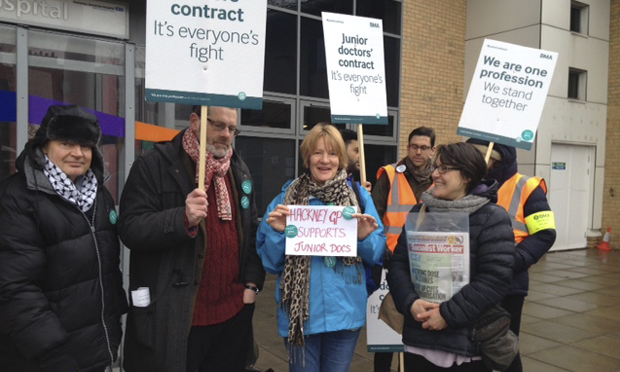Homerton junior doctors to join six-day strike

Everyone’s fight: The junior doctors’ previous strike in progress at Homerton Hospital. Photograph: Coral Jones
Junior doctors at Homerton Hospital are set to take part in the longest junior doctors’ strike ever.
The strike runs from 7am tomorrow, Wednesday 3 January, through to 7am on 9 January.
If it goes ahead as planned, the latest strike will be the longest continuous stretch of industrial action in the history of the NHS.
The six-day strike is over an ongoing pay dispute with the government.
This strike action follows on from the previous strike last month.
The British Medical Association (BMA), which negotiates on behalf of all UK doctors, said patient safety remains a top priority.
The member-led organisation is arguing that while workload and waiting lists are at record highs, junior doctors’ pay has been cut by more than a quarter since 2008.
It says that a cost-of-living crisis, burnout and well-below inflation pay rises risk driving doctors out of their profession.
It says that if junior doctors are forced out of the NHS because of poor pay and conditions, the services we all rely on will suffer.
Dr Rob Laurenson and Dr Vivek Trivedi, co-chairs of the BMA’s junior doctors committee, said: “It’s incredibly disappointing that we’ve had to call this strike – no doctor ever wants to have to take industrial action.
“We would still, at this late hour, encourage the government to put forward a credible offer so that we can stop this strike and get back to doing what we really want to do – care for patients.”
According to NHS London, the total of acute inpatient appointments cancelled due to the strikes which began in December 2022 now stands at 33,000 – with an additional 304,000 acute outpatient appointments cancelled due to the ongoing action over the past year.
Over the previous industrial action period, a three-day strike from 7am on 20 December to 7am on 23 December 2023, there were 25,366 cancellations of acute inpatient and outpatient appointments in London.
At the peak of the action, 4,501 staff were not at work in the capital.
Junior doctors make up around 50 per cent of doctors in the NHS and, despite extensive planning and cover arrangements in place, the latest strikes are expected to cause significant widespread disruption.
Junior doctors are qualified doctors in clinical training.
They have completed a medical degree and can have up to nine years’ of working experience as a hospital doctor, depending on their specialty, or up to five years working and gaining experience to become a general practitioner (GP).
The NHS says that emergency care will continue to be prioritised during the industrial action.
However, the six-day strike is likely to have a significant impact on routine care, from outpatient appointments to elective surgery.
Patients are being urged to continue to call 999 and use A&E in life-threatening emergencies, with cover provided by more senior consultant doctors on strike days.
